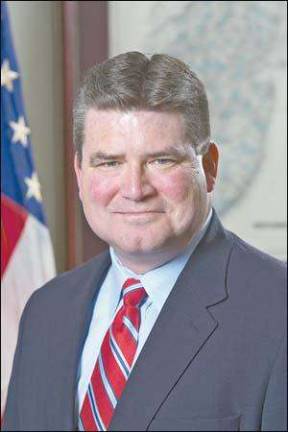Oroho reflects on a year in state government

State Senator responds to questions on the job, politics and New Jersey, By Mark J. Yablonsky FRANKLIN It has now been a little over a year since Sen. Steve Oroho (R-24) became a member of the state legislature, replacing longtime Sen. Robert Littell. Oroho, whose district includes all of Sussex County, and parts of Morris and Hunterdon counties, represents a total of 31 towns. He is both a former Sussex County freeholder (2005-07) and a former Franklin Borough councilman (2001-06). He took time out from his hectic schedule last week to talk about what it’s like to be a New Jersey senator. Q. How different is being a senator from the two previous public offices you’ve held? A. You’re now dealing with statewide issues. Some of the things you deal with may not affect your district, but there are state impacts. Obviously, the budget’s bigger. I would suggest that the fiscal discipline of the counties I represent is significantly different from that of the state’s. I have seen more fiscal discipline from my counties than I have from the state. The issues get bigger and you’ve got to learn more that affect the state. But being on local and county governments, that’s where it meets the road; those are the most emotional and hardest levels of government. And on the municipal and county level, I was always in the majority; but now, I’m in the minority, so you’ve got to learn how to be effective. But at some time, I hope I’m back in the majority again. Q. In recent times, Trenton has issued dire fiscal warnings, and how necessary it will be to cut back on more aid to counties and local governments. What might be done? Is there more that people don’t realize? A. New Jersey has some real fiscal problems. Some of these court decisions ... have made New Jersey more expensive and less affordable to live in. They have certainly increased the expenditures of the state. The courts blame the legislature and the administrations, and the administrations and legislature blame the courts. I believe firmly that the legislature needs to change the statutes that the courts are interpreting. I think it’s important for the state’s elected officials to have the mindset of what the total cost of government is all levels, county, state, local and school boards. It’s all paid for by the residents of New Jersey. There’s a lot of cost shifting that occurs. It’s absolutely possible to break it down and make government in New Jersey more accountable. Q. Describe the average day in the life of a New Jersey state senator. A. It’s going to sound like a cliché, but there’s no average day. The most important thing that I’ve learned this past year is the things that happen in Trenton are important; but more important is the work that’s done at the district office for the constituents of the district. The most important thing we do is to help a constituent maneuver and get information from the maze called state government. And I’m extremely fortunate to have excellent colleagues like Allison McHose (R-24) and Gary Chiusano (R-24); and an excellent staff of Jeff Spatola, Lou Criscitelli, Helen Carew, Alexandra Navarra, Linda Sauder, Andrea Cocula and Paul Licitra. We’re not politicians; we’re elected officials that are there to help people. Sometimes, we won’t always like the answer we get, but we will get an answer.” Q. New Jersey is often said to have a culture of corruption. Is this so and from what you can see, is Trenton trying to fix itself? A. I would first say that the corruption grabs the headlines. Most of the people elected to office are good people. You hear about the negative, but you never hear, or you hear less often, about the people who are there just to do a good job. It’s a double-edged sword; the corruption gets the headlines, so people think all politicians are corrupt. There needs to be a message sent about corruption: It’s wrong and anyone corrupt has to pay. However, the wide majority is there to do the right thing. There are further ethical reforms that the state of New Jersey should continue to push; that means pay-to-play, the wheeling of money around by political machines and dual office holding. They stopped dual office holding, but they kept the grandfathering in and that should not have happened. I don’t have a problem with someone who wants to finish a commitment, but that commitment should not last for more than one year.